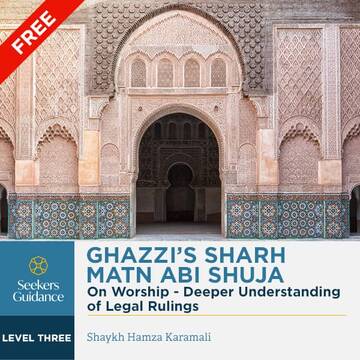
This is the first of an eight-part traditional word-by-word explanation of a sharh (interlineal commentary) on the post popular primer in Shafi‘i law, Matn Abi Shuja‘. Hamza Karamali carefully works through the chapter of purification, the prayer, Rules of Zakat, Fasting and Hajj. relating the rulings to contemporary situations and explaining the hadith evidence and wisdom behind them. This is a course for experienced students of knowledge who have studied the Islamic sciences for many years
- Teacher: Shaykh Abdurragmaan Khan
- Teacher: Mawlana Irshaad Sedick
Matn Abi Shuja‘ is the most popular primer for students of the Shafi‘i school. Its importance can be measured by the dozens of commentaries and glosses that have been written on it over the centuries since it was written. This course is a contemporary explanation of its most commonly-studied commentary, Fath al-Qarib al-Mujib by Shaykh Muhammad b. Qasim al-Ghazzi (d. 918 AH / 1512 CE). Shaykh Muhammad b. Qasim al-Ghazzi was a late scholar of the Shafi‘i school who lived and taught in Egypt. His teachers included the great Shaykh al-Islam Zakariyya al-Ansari, who was the teacher the major authorities of the Shafi‘i school. Fath al-Qarib (or Sharh Ibn Qasim, as it is popularly known) is an integral part of Shafi‘i curricula worldwide. It is particularly important because it was the subject of a hashiya (gloss) by the rector of al-Azhar in his time, Shaykh Ibrahim al-Bajuri (1276 AH / 1860 CE), may Allah Most High have mercy on him, which is one of the most important books in the Shafi‘i school.
- This is a level three course
- Complete all four parts of Introduction to Sacred Law (Shafi‘i) before taking this course
- Reading fluency in Arabic is a prerequisite for taking this course
- Develop the skill of reading the mutun, shuruh, and hawashi of the Muslim scholarly tradition
- Deepen your understanding of traditional sacred law according to the Shafi‘i school
- Learn the detailed rulings of water, tanning, containers, wudu, using the bathroom, ghusl, wiping over khuffs, tayammum, wudu with bandages and casts, najasa, and menstruation
- The rules, conditions, integrals, invalidators of the prayer, along with many other types of prayer
- The rules, conditions, integrals, invalidators of the zakat, fasting and Hajj.
- Learn how to apply traditional sacred law to modern situations